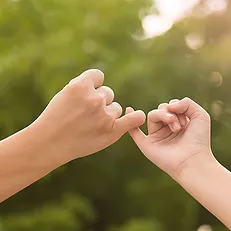The Power of Making & Breaking Promises... to Ourselves
Today I started to post another installment of my Unconventional 12 Days of Christmas, when I quickly realized I have more to say on the subject than what an abbreviated caption on social media will allow. This one is important! So, I wanted to give us more space to really tease it out. Today’s topic? Breaking promises. To ourselves.
This might not seem like that big of a deal to some of you, and maybe you’re great at keeping commitments to yourself. But if you can relate in any way to breaking your word to yourself, then stick with me- because you might be surprised at the consequences and far-reaching implications of this corrosive “little” habit.
This idea was originally inspired by a conversation with a friend. We were discussing what promises we were making to ourselves before the New Year in an attempt to avoid the whole “resolution dissolution” thing that usually happens around 6 weeks into the fresh calendar.
My friend shared a quote she saw on social media that resonated with her. “I read a saying recently that really stuck. ‘Discipline: because you won’t always feel motivated.’ I really like that thought! Maybe I’ll print it and put it some place where I can see it every day.”
I nodded and said, “For me, that sounds like a shame storm waiting to happen the first time my ‘discipline’ doesn’t show up, either.” We both laughed a knowing laugh, communicating we had both been there, both have the broken promises to prove it.
Why do we do that?
Why is it so much easier to keep promises to others than it is to keep them for ourselves? And why is it so important to make a shift in this behavior?
The Science of Breaking Promises to Ourselves
According to Michelle Gielan, a wellness expert from UPenn, “When we don't keep a promise to someone, it communicates to that person that we don't value him or her. We have chosen to put something else ahead of our commitment. Even when we break small promises, others learn that they cannot count on us. Tiny fissures develop in our relationships marked by broken promises.”
I appreciate her perspective, and if we apply this idea to our inner self, we see the potential for those same “tiny fissures” to develop in our relationship with the various parts of ourselves, as well. (Think about this in light of last week’s blog about our inner child and we see the power it holds to destroy our ability to trust ourselves.)
This holds special implications for those of us with childhood trauma. Many of us found ourselves in a parenting role early in life, either parenting a sibling, parenting a parent, parenting ourselves, or some combination of all three. So, the idea that we would put something (or someone) else ahead of our commitment to ourselves makes perfect sense. We’re conditioned to make our needs and wants the last ones to get our attention.
Additionally, research at the University of Zurich using fMRI technology shows that breaking promises registers in the brain as emotional conflict. Couple this with how breaking promises erodes trust, we can follow the logic to see how this can create feelings of shame and deliver a blow to our sense of self-worth.
It doesn’t take many broken promises strung together before we begin to see ourselves as flaky and unreliable. Our confidence takes a hit and that has a ripple effect that reaches far into our relationships and even our careers.
Reasons We Break Promises to Ourselves
There can be any number of reasons why we find it difficult to keep our word to ourselves, but if we follow the stem of those reasons, we can find some common roots.
We believe our needs/wants should come last- so if keeping a promise means saying “no” or even “not now” to someone else, we will deny ourselves. Every. Time.
We don’t acknowledge our own worth. We see ourselves as unimportant, so we invalidate our needs.
We fear the failure of not being able to keep our commitment to ourselves, so we don’t make them in the first place.
We believe we have an endless supply of energy and/or emotional margin, we don’t admit we have needs.
We fear upsetting someone else by putting ourselves first once in a while.
We believe its unkind, uncaring or selfish to say “yes” to ourselves.
If you didn’t immediately resonate with a particular reason(s) behind your own broken promises to yourself, that’s not surprising. These beliefs and habits aren’t so easily recognized. As mentioned before, the roots can be buried deep in our childhood. They can even be from messages that have echoed in your family from one generation to the next.
Regardless of whether these beliefs and habits started with you, you can be the one to break the cycle and become a healthy example of what it means to keep promises to yourself. But first, this will require developing some new habits and beliefs.
Ideas To Help Improve Your Promise Keeping
Once you acknowledge your tendency to break promises to yourself, the next step in becoming a promise keeper is to develop some new habits aimed at improving your self- commitment-keeping skills.
Write down and display the promise you’ve made to yourself along with the benefit of keeping the promise. It can be a tremendous motivator to be reminded of your “why.”
Treat yourself as you would a friend. Employ a mantra, something like, “I will be as good of a friend to myself as I am to others. I will keep this promise.”
Break down the promise into SMART goals. SMART stands for…
Specific: Well-defined, clear, and unambiguous
Measurable: Be specific and measure your progress
Achievable: Attainable/not impossible to achieve
Realistic: Within reach, realistic, and relevant to your purpose
Timely: Clearly defined timeline; date and target date. Create some urgency.
Only make promises to yourself about the things that matter to you. Don’t make a promise based on pressure from others.
Share the promise(s) you make to yourself with a trusted friend. Let them know you’re working to develop a habit of keeping promises to yourself. Ask them to be your accountability partner.
As you start to make good on the promises you’ve made to yourself, don’t be surprised if you feel a new sense of confidence and energy. You may even feel a stronger sense of balance in your relationships.
It’s important to remember that the most valuable gift you have to give to this world is you! Please treat yourself with the kindness and respect you deserve. Keeping your word to yourself is a great way to put that kindness and respect into action. You are worth it!



